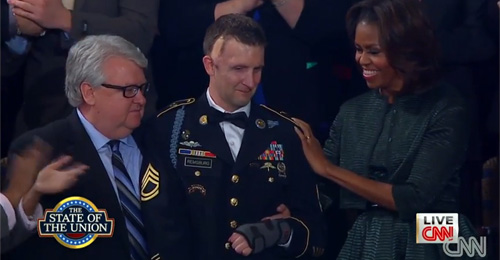
Army RangerCory Remsburg attending the SOTU Address with First Lady Michelle Obama, January 18, 2014
Army Ranger Sgt. First Class Cory Remsburg has met President Obama on three separate occasions “by chance and in very different circumstances.”
The first meeting was near Omaha Beach in France back in 2009 during celebrations for the 65th anniversary of the D-Day landings during World War II. Sgt. Remsburg was serving as part of an elite Ranger group that was selected to re-enact a parachute drop as part of those celebrations.
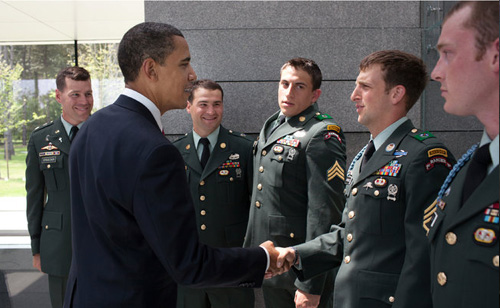
President Obama meeting Sgt. Cory Remsburg, Near Omaha Beach, France, 2009. SOURCE: Pete Souza/The White House
The second meeting was less than a year later when the President met Sgt. Remsburg during one of his periodic visits to Bethesda to see wounded soldiers and veterans.
“And as I walked into his room, I saw a picture on the wall — and it was a picture of the two of us together. See, I had met Cory before, back at the D-Day anniversary in Normandy. A good looking young man, a proud Army Ranger, he had joined in a reenactment of that historic paratroop jump.”
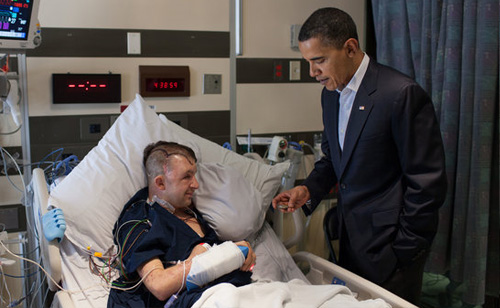
President Obama meeting Sgt. Cory Remsburg, Bethesda, 2010. SOURCE: The White House
The third meeting was two weeks ago in Phoenix, Arizona, in a private meeting.
As reported by Jackie Calmes of The New York Times on August 22, 2013:
One of his [Pres. Obama’s] speechwriters, Terry Szuplat, who had drafted the president’s speech to the disabled veterans, stayed in touch with the soldier’s father, Craig Remsburg, over the next three years. So when Mr. Obama was again due to speak at the disabled veterans’ annual convention, this month in Orlando, Fla., the speechwriter worked with the president and the Remsburgs to include an update on their son’s progress.
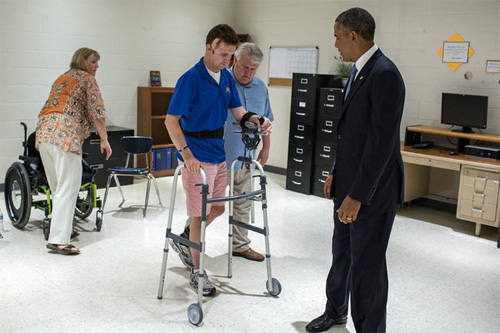
President Obama meeting Sgt. Cory Remsburg, Phoenix, Arizona, August 2013. SOURCE: The White House
Here you can see President signing photos from Normandy of him and Sgt. First Class Cory Remsburg.
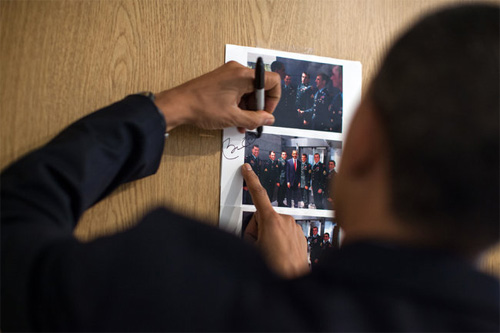
SOURCE: White House photo/Pete Souza
You can watch a news report below, from WFMY News 2, covering Sgt. Remsburg’s return home to Gilbert, Arizona, three years after he was nearly killed in Afghanistan followed by excerpts from two speeches by Pres. Obama talking about the sergeant.
Remarks by The President at Disabled American Veterans Convention
The road of recovery is often such a long haul. And America needs to be there for you during that long haul. And that’s the lesson of the extraordinary young man I told you about when I spoke to you three years ago — an Army Ranger, Sergeant First Class Cory Remsburg.
A massive IED in Afghanistan nearly killed him. He was in a coma for months, with severe traumatic brain injury. And I told you then how, when I saw him in the hospital, he had come out of the coma, but he still couldn’t speak. And when I asked how he was feeling, he slowly brought his hand up and he pulled his fingers together and he gave a thumbs up. His mom was sitting there with him.
A few days ago, I saw Cory and his family again, this time in Phoenix where they live. So I wanted to give you an update on how he’s doing. I suspect it won’t surprise you to know that for Cory, the years since he was injured have been very hard — brain surgeries, half dozen of them; surgeries to replace part of his skull; eye surgeries; special procedures on his lungs; skin grafts and skin flaps — all told, dozens of surgeries and procedures.
Rehab has been grueling. On a typical day, Cory wakes up and spend hours in therapy — physical therapy, occupational therapy, speech therapy. Progress has come slowly, but it has come. He had to learn the simple things all over again — how to speak, how to write his name, how to throw a ball. And this past spring, he reached another milestone. After years in the hospital and rehab facilities, he finally came home greeted by hundreds of neighbors and friends waving American flags.
And so when I saw Cory a few days ago, he is still blind in one eye. He still struggles to move his left side. But the young man I had seen in that hospital bed unable to speak, barely able to move, this time he was in a chair sitting up — alert, smiling, talking. And then, he wanted to show me something. And he leaned out of his chair. And he reached out and grabbed his walker. And with the help of his parents, he pulled himself forward and he stood up. And he looked at me, and he gave me a sharp salute. (Applause.) He said, “Rangers Lead the Way.” (Applause.)
And his stepmom held one arm for balance and I held the other. And then, Cory took a step — then another, and then another one after that all the way across the room. Little by little, Cory is learning to walk again. (Applause.) And he’s starting to get good on his recumbent bike. He hopes to bike in a race this fall — 42 miles. He’s scheduled to move into his own home adapted to his needs with the help of a caregiver — another step towards the greater independence he seeks. And so Cory says, “My recovery has not been easy. Nothing in life that’s worth anything is easy.” But he says, I don’t “give up.”
The war in Afghanistan may be ending, but for Cory and our disabled vets, the work has only just begun. Cory is 30 years old. His recovery — like so many of yours — will last a lifetime. But he won’t give up, because you haven’t given up. And when it comes to our work, to making sure that our nation is fulfilling its promises to the men and women who served and sacrificed, America cannot give up either. I will not give up. We cannot give up.
Remarks by the President at Disabled Veterans of America Conference in Atlanta, Georgia
I want to make special mention of a truly inspiring American, Staff Sergeant Cory Remsburg. He was at Bethesda during one of my periodic visits to see our wounded warriors. And as I walked into his room, I saw a picture on the wall — and it was a picture of the two of us together. See, I had met Cory before, back at the D-Day anniversary in Normandy. A good looking young man, a proud Army Ranger, he had joined in a reenactment of that historic paratroop jump.
Then soon after, Cory served on his 10th deployment since 9/11 — that’s right, his 10th deployment. And that’s when an IED nearly took his life. The traumatic brain injury was severe. Cory was in a coma for months. It seemed possible that he would never wake up.
But then something happened. His doctors still can’t explain it. His parents called it a miracle. Cory opened one of his eyes. Then a few weeks later, he moved a leg. Then he moved an arm. And there at Bethesda, we were meeting again. And Cory still couldn’t speak. But he looked me in the eye. He lifted his arm and he shook my hand firmly. And when I asked how he was feeling, he held up his hand, pulled his fingers together and gave a thumbs up. (Applause.)
Today, Cory is at a VA hospital in Florida. And with the support of his family and VA staff, he’s working hard every day to regain his strength. He’s got to learn to speak all over again. He’s grateful for the visits he’s received from friends and supporters — including the Disabled American Veterans. (Applause.)
And Cory is only 27 years old. He knows he’s got a long and very hard road ahead. But he pushes on, and he’s determined to get back to his fellow Rangers. And when someone at the hospital said, “Cory, you’re going to walk out of here someday,” he said “No, I’m going to run out of here.” (Laughter and applause.)
So to Staff Sergeant Cory Remsburg, to the Disabled American Veterans — I want to say to all of you, you are the very essence of America, the values that sustain us as a people, and the virtues our nation needs most right now. And the resilience that, in the face of great loss, so many of you experienced, I know you, like Cory, know what it means to pick yourselves up and keep pushing on.
And that sense of purpose that tells us to carry on, not just when it’s easy, but when it’s hard, even when the odds seem overwhelming — that’s what we’re about. The confidence that our destiny is never written for us, it’s written by us. The faith, that fundamental American faith, that there are always brighter days ahead; and that we not will not simply endure, but we will emerge from our tests and trials and tribulations stronger than before — that is your story. That is America’s story. And I’m proud to stand with you as we write the next proud chapter in the life of the country we love.
PHOTOS: Pete Souza/The White House

You must be logged in to post a comment Login